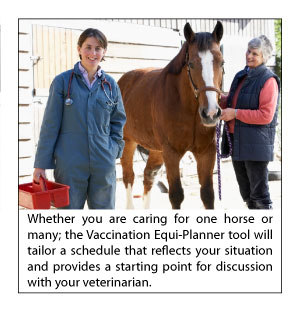ARCHIVE EQUINE NEWS STORIES
| Current news is available at TheHorsePortal.ca, Equine Guelph's online learning platform for practical, quick learning. Given the vast amount of information on horse health and welfare, Equine Guelph has archived its past news articles from 2002-2020. They are listed below, along with a search function available to find specific healthcare topics. | |
Prevention is ParamountApril 2012
Equine Guelph offers Vaccination Equi-Planner
-by Jackie Bellamy
 Springtime! A time for renewal, growth — and it’s breeding season. Unfortunately, mares are not the only things being bred. Disease should always be a concern if you are a horse owner and spring serves as a reminder to check your horses’ vaccination records. Equine Guelph’s Vaccination Equi-Planner, sponsored by Merck Animal Health, is a useful tool designed for horse owners to generate personalized immunization schedules for their horses.
Springtime! A time for renewal, growth — and it’s breeding season. Unfortunately, mares are not the only things being bred. Disease should always be a concern if you are a horse owner and spring serves as a reminder to check your horses’ vaccination records. Equine Guelph’s Vaccination Equi-Planner, sponsored by Merck Animal Health, is a useful tool designed for horse owners to generate personalized immunization schedules for their horses.
Now more than ever, with the latest identification of EHV-1 in Ontario, it is important to make sure your horses are protected. The Vaccination Equi-Planner is a tool that is customized to each horse owner’s needs. Whether you are caring for one horse or many; a broodmare or a companion horse, the tool will tailor a schedule that reflects your situation and provides a starting point for discussion with your veterinarian.
Horse owners are asked to complete six questions that help determine individual farm differences and risk factors, including: age, use, sex, exposure to outside horses and geography. This data is then compiled in a program, and a printable customized vaccination schedule is provided for each horse. Owners are encouraged to review this with their veterinarian so that current disease patterns and individual circumstances are also taken into account for the best program to protect your horses.
Dr. Richard Conrad, Technical Services Consultant for Merck Animal Health explains, "Vaccination is an essential part of basic horse care for the prevention of disease and possibly death. Horses are susceptible to numerous diseases which can be fatal. Acquiring natural immunity from exposure is not practical since the horse may not survive the natural exposure. For example, in 2011 there were confirmed horse deaths in Ontario from West Nile virus and Eastern Equine Encephalomyelitis.” He continues, “The numbers become insignificant if the death happens to occur with your horse. Other important considerations are diseases which can be transmitted to humans such as rabies. Although the incidence is low, the impact can be devastating. Only vaccination can prevent death from certain diseases. "
To access the Vaccination Equi-Planner, go to